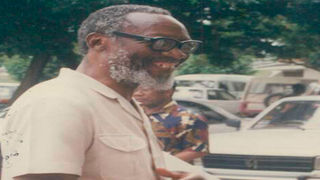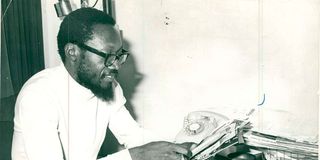
Veteran journalist Hilary Ng’weno, best known as the founder of the iconic Weekly Review news magazine. He passed away on July 7, 2021.
| File | Nation Media GroupNews
Premium
My chance entry into journalism and encounter with iconic Hilary Ng’weno
If Hilary Ng’weno had not been blessed with a sense of humour and the daring to try out raw untested talent, I might never have become a journalist.
Another employer would have dismissed my letter of application for employment as impudent or insulting, if not outright mad.
It’s a long story. Towards the end of August 1986, a job advertisement for Sub-Editor in The Weekly Review caught my interest.
I was working as a designer and instructor at the Ministry of Labour’s Kenya Textile Training Institute, with absolutely no experience or training in journalism, but I decided to apply anyway.
I had one thing going for me: Much earlier in life I had shared a desk with my former high school classmate, Wachira Waruru, while on a vacational job as clerk at the Cooperative Bank of Kenya during the gap period between completing ‘A’ Levels and joining university.
At that time Wachira occasionally used to pen ‘Letters to the Editor’ for the daily newspapers, and would routinely pass on his handwritten scripts for my comment and input.
If I could sub Wachira then, I reasoned, I could still do it now. He was then Senior Reporter with The Weekly Review, having ventured into journalism early on while still a university student, stringing for Hilary’s Nairobi Times newspaper before being absorbed by its The Weekly Review stablemate after graduation.
He’d often urged me to try my hand at journalism, probably recalling how I used to clean up his copy years earlier, but I never quite got round to it.
When I saw that advert, however, I decided to give it a shot. I had been an ardent reader of The Weekly Review since its inception in 1975 when I was in Form 2.
My admiration for Hilary had started much earlier, probably while still in primary school, through his satirical ‘My Friend Joe’ pieces in the Daily Nation.
When the fictional character Joe Kihara evolved into a full-fledged humour magazine run by Hilary and the brilliant pioneering editorial cartoonist Terry Hirst, my dad’s budget had to include my regular supply of Joe Magazine.
Along the way, Joe evolved beyond humour and satire into serious politics, serving as the launching pad for what was initially titled Hilary Ng’weno’ s Weekly Review. I went along with the transition and never missed a copy.
Back to the start of my career in journalism. To date I don’t know if it was a moment of madness, but instead of doing a formal application letter, I took the current edition of The Weekly Review and edited the cover story.
I didn’t just cross the ts and dot the is, but practically put scissors to paper, cutting out entire paragraphs and shifting them. Working from a design studio where there was plenty of Cow Gum around was a distinct advantage, as was my previous experience as a paste-up artist.

Veteran journalist Hilary Ng’weno, best known as the founder of the iconic Weekly Review news magazine. He passed away on July 7, 2021.
My covering letter said that since every week I had so much fun trying to decipher where stray paragraphs and columns ought to have been (That was the era of galley proofs where copy was physically glued together and sometimes mistakes were made), I might as well get paid for doing it.
Once done, I put my handiwork in an envelope and on my way home in the evening passed by the Weekly Review offices at Agip House.
I was already wondering why I was doing such a foolish thing, so didn’t even knock to be let in, but just quietly slipped my application letter under the door and made a quick exit.
I never informed Wachira what I’d done, and never really expected a response.
Hence it was to my great surprise when the very next day, I got a call from the WR News Editor Peter Kareithi inviting me to go over as soon as possible.
I went over the same day and met Kareithi and Managing Editor Sarah Elderkin, who informed me that the Sub-Editor position might not be for me, but there was a vacancy for reporter if I was interested.
I jumped at the chance, learning that they were looking for a replacement for seasoned writer Mutegi Njau, who was crossing over to the Daily Nation.
My interview was not the routine oral interrogation and scrutiny of my academic papers, portfolio and experience. I’d never trained or worked as a journalist in my life.
It was a practical experience. On that Thursday morning I was instructed to go and write an analysis on the latest instalment of the raging ‘Queuing Debate’, and bring it back by close of business the same day.
It was the pre-PC and laptop days. I delivered my laboriously composed handwritten script late that evening.
On Friday morning I picked up a copy of WR on my way to work, and found that the cover story was on the same subject I had been tested on. I dare say it my version was not too far off from the WR quality.
That same afternoon I got the call. A job offer with a starting salary of Sh6,000/- per month, a considerable improvement, almost double my government salary. I jumped at the chance, but told them I could not start immediately because I had to give my employer a notice of one month. WR told me not to worry as they’d take care of that.
It was my great pride to start my journalism career at the prestigious and ground-breaking news magazine.
With The Weekly Review Hilary had introduced a brand of analytical journalism unseen and unmatched in the region.
Although a very small company compared to established mainstream groups such as the Nation and the Standard, Hilary was able to attract and retain the best journalists available by offering competitive terms, not to mention the pride and recognition that went with being associated with such a prestigious publication.
For me it was a great learning experience that could not have been found at any other media in Kenya.
It was refreshing working in the small, tightly knit newsroom with little bureaucracy or stuffy, formal structures, and where the boss was simply Hilary or HBN; no formal titles for anybody.

Veteran journalist Hilary Ng’weno (centre), best known as the founder of the iconic Weekly Review news magazine. He passed away on July 7, 2021.
And just as important, no suits, ties and other stuffy formal attire.
Hilary never wore a suit and tie as far as anyone could remember. His idea of smart was a faded, grey Kaunda suit. There was also the familiar corduroy jacket with elbow patches complemented by casual khaki trousers and Bata Safari Boots or other sturdy walking shoes, and a scraggly beard, a style faithfully copied by a good number of his mentees, notably Peter Kareithi who is now a journalism professor in the United States.
I was surprised on starting work that HBN was not a constant presence in the newsroom. Like many, I had assumed that he wrote most of the magazine himself as the stories carried no by-lines.
What I learnt was that his only regular contribution was the Leader, a space he held sacrosanct as Editor-in-Chief.
In fact he hardly ever came to the newsroom, working out of his Pioneer House office about a kilometre away. Initially when I joined he never even used to attend editorial conferences, until much later when the political tempo picked up in earnest and we, the editorial staff, asked for a closer guiding hand.
It must have been months into employment that I finally laid eyes on HBN, previous communications restricted to telephone calls and the written instructions scribbled on the carbon copies all reporters sent to him.
What he did was guide, mentor and train, not in a formal structure but simply by going through our copy and making remarks and suggestions and asking questions in his familiar scrawl.
Another surprise on joining WR was that all the reporters were fairly young, in fact contemporaries who had left university at about the same time as I in 1983, and learned the finer ropes of writing on the job.
Although WR was famous for political analysis, Hilary insisted on reporters being all-rounders and able to produce quality copy on virtually any topic.
Hence, over the years, outstanding cover stories on environment, wildlife, medicine, agriculture, sports, education and other topical subjects.
Quietly spoken, aloof and remote, Hilary unlike many of his peers was a loner who avoided the often raucous social scene and bar culture beloved of journalists.
He had a deep and abiding interest in issues such as promoting the love of science for the young, penning a number of primers for children.
Although he generally avoided close association with politicians, the nature of his job made it mandatory for him to have on speed dial anybody that mattered.
The venerable WR, clearly a publication before its time, folded in 2002, but set standards in journalistic excellence that all else have since tried to emulate.
No wonder that for many years after that, in all the main newsrooms in Kenya, there was always a core of writers referred to as the Weekly Review gang or the HBN Mafia.
The flag still flies high.





